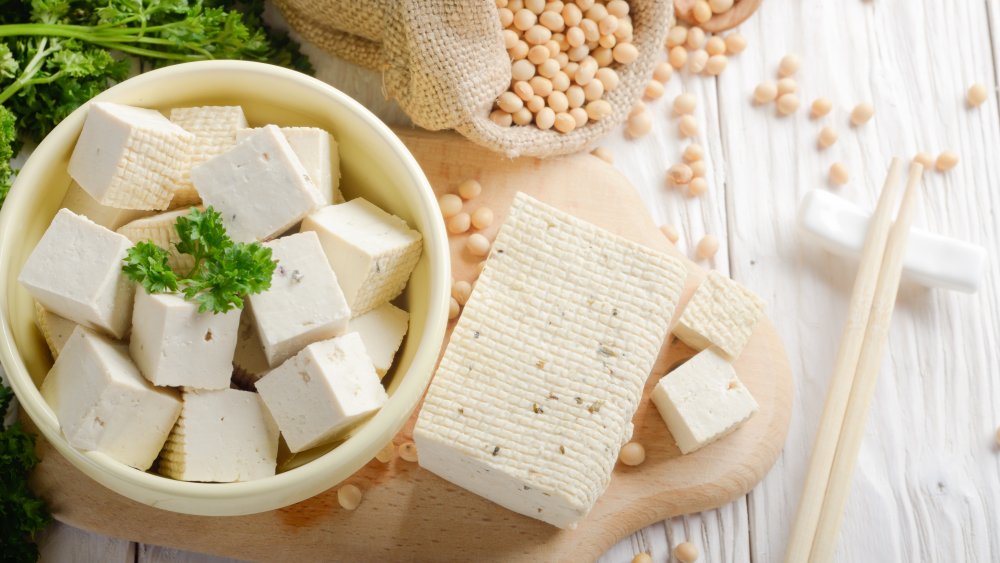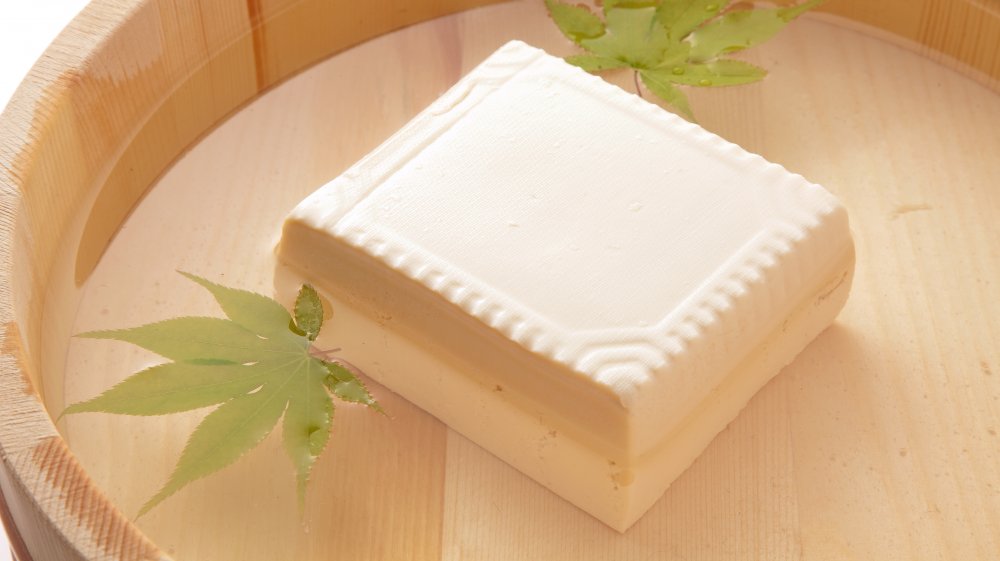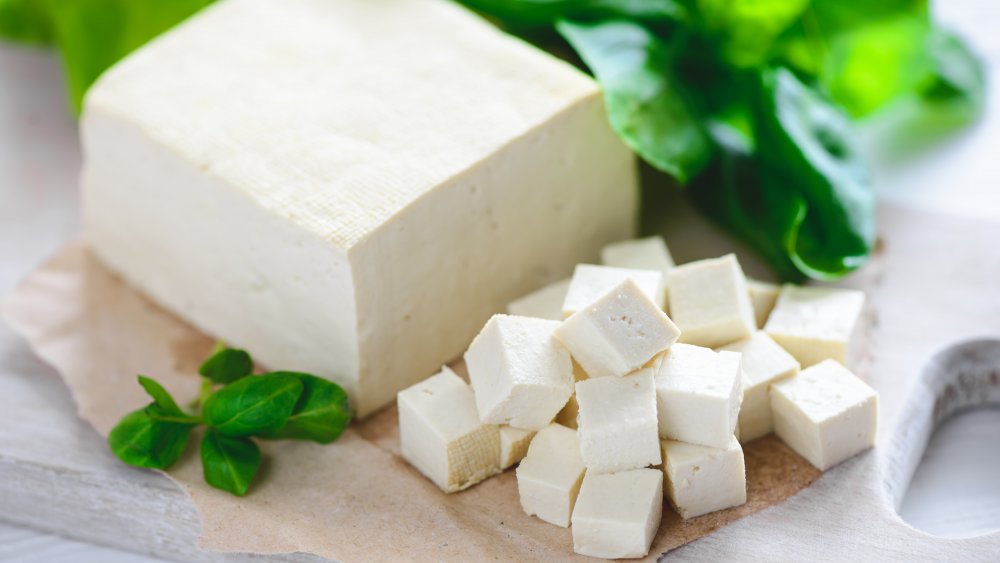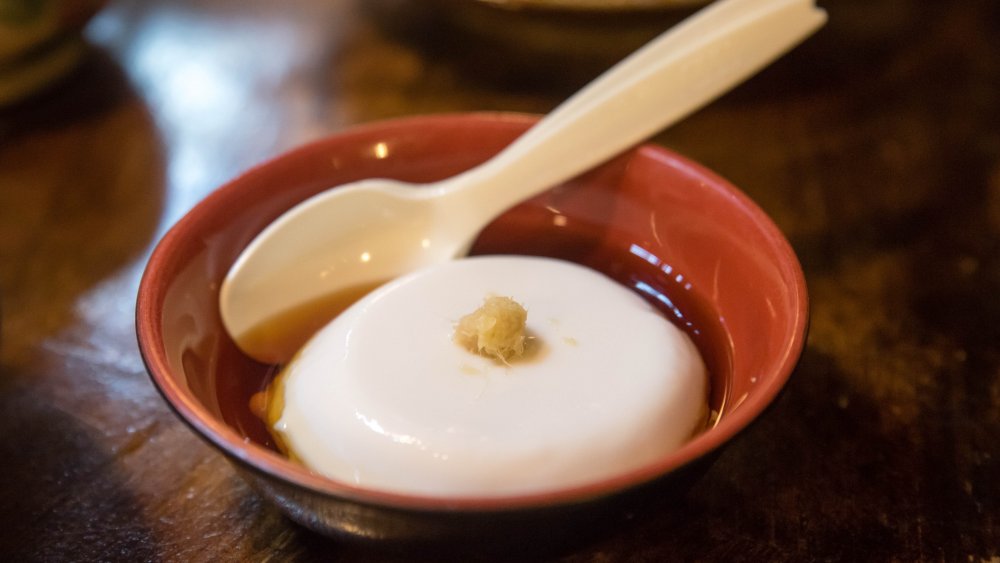Here's What Happens When You Eat Tofu Every Day
Tofu has a long and storied history, and before the advent of plant-based proteins like Beyond Meat, which makes burgers out of pea proteins (via Beyond Meat), it was seen as something of a godsend by vegetarians who longed for a meat substitute that was high in protein.
Tofu traces its roots to China and is thought to have originated more than two millennia ago, perhaps by accident when the addition of seaweed to soy milk caused the milk to curdle (via BBC). The modern-day process of making it is actually quite similar to the cheesemaking process — the soy milk is curdled, pressed into blocks, and allowed to cool.
It's extremely versatile, too — tofu dishes can be crispy or soft and silky, and a number of textures in between. As a result, tofu or similar products are used widely across a number of world cuisines. Because of its neutral taste, it takes on the flavor of the dish it's in, which is why you can find savory dishes as well as tofu desserts. It has a number of health benefits as well.
Here's what happens if you eat tofu every day.
Your bad cholesterol levels may take a dip
Cholesterol is a waxy substance found in the body which is required for the production of vitamin D and certain hormones (via Medline Plus). However, it's needed in moderation, and too much cholesterol will result in plaque buildup in the arteries, which is formed when cholesterol is mixed with other substances in the body.
Cholesterol is typically split into two types, HDL (high-density lipoprotein) and LDL (low-density lipoprotein). LDL is the type that can cause plaque buildup, while HDL helps to transport cholesterol back to the liver where it's filtered from the body. A reduction in LDL cholesterol can result in a lower risk of high blood pressure and atherosclerosis.
Isoflavones, a component of the soy proteins found in tofu (via Oregon State University), have been shown to decrease the amounts of LDL cholesterol found in the body, although the Food and Drug Administration reports that at least 25 grams must be eaten on a daily basis for any noticeable difference in cholesterol levels (via Medical News Today).
Your risk of breast cancer might increase... or it might not
There have been a number of studies on soy protein and its relation to cancer, but the jury is still out.
Some researchers have posited that high levels of soy consumption may increase the risk of breast cancer because the isoflavones in tofu have a chemical structure similar to estrogen, which, in high levels, can boost the risk of breast cancer (via Medical News Today).
However, other studies have found that the consumption of soy products like tofu might actually decrease the risk of breast cancer. This is due to the presence of genistein, the most commonly found isoflavone in soy protein, which has a powerful antioxidant effect that may prevent the growth of tumors. One study found that among 10,000 breast cancer survivors, the consumption of 10 milligrams of isoflavones resulted in a reduced recurrence of breast cancer (via The American Institute of Cancer Research).
However, scientists aren't yet confident enough in the results of these studies to recommend soy intake to breast cancer patients or survivors, and have suggested that more studies are needed.
Your chance of diabetes may decrease
Isoflavones have also been shown to reduce the risk of type 2 diabetes. Also known as adult-onset diabetes (although this term has been used less in recent years because of how many children are developing the disease), this condition occurs when your body cannot regulate insulin levels and as a result, blood sugars are too high (via The National Health Service). However, the isoflavones contained in tofu and other soy proteins are thought to help in aiding the control of blood sugar levels (via Healthline). A study found that not only did the consumption of isoflavones over the course of a year help in improving insulin sensitivity, but also reduced the risk of cardiovascular disease (via The National Library of Medicine).
Another study found that in healthy postmenopausal women, a daily supplement of 100 milligrams of isoflavones from a soy source reduced the level of blood sugar and reduced insulin levels by nearly a quarter (via The National Library of Medicine).
You'll get your fair share of protein
The suggested serving size of tofu is 100 grams (3.5 ounces), which contains 8 grams of protein (via Healthline).
When it comes to judging the proteins, scientists look at the number of amino acids the protein contains (via Oprah). While meat tends to be a complete protein (i.e., it contains all nine essential amino acids the body needs to function), most plant-based proteins are incomplete proteins. Not so with tofu! Tofu, like meat, contains all nine essential amino acids (although scientists say that the quality of these amino acids isn't as high as what you'd find in meat products).
It has more protein per cup than milk (20.2 grams vs. 15.3, respectively), and eating just a cup of tofu will bring you to about half of the recommended daily allowance (56 grams for men and 46 grams for women, via The Spruce Eats).
Also, given that tofu contains just 100 calories for every 11 grams of protein and only five grams of fat per every half cup, it's a low calorie and low-fat way to take in protein as well.




